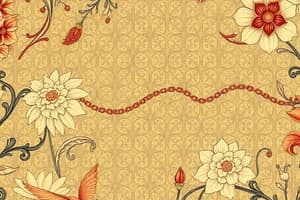Podcast
Questions and Answers
Which of the following best describes the relationship between reliability and measurement error?
Which of the following best describes the relationship between reliability and measurement error?
- Reliability and measurement error are related but not opposite concepts
- Reliability and measurement error are completely opposite concepts
- Reliability and measurement error are two sides of the same coin (correct)
- Reliability and measurement error are unrelated concepts
What is the classical test theory?
What is the classical test theory?
- A theory that defines the conceptual basis of reliability (correct)
- A theory that defines the conceptual basis of test administration
- A theory that defines the conceptual basis of measurement error
- A theory that defines the conceptual basis of validity
What are true scores?
What are true scores?
- A score that includes measurement error
- A score that is devoid of measurement error (correct)
- A score that is estimated quantitatively
- A score that represents construct scores
Which of the following statements is true regarding true scores and construct scores?
Which of the following statements is true regarding true scores and construct scores?
What is the relationship between observed scores and true scores?
What is the relationship between observed scores and true scores?
What is the ideal relationship between observed scores and error scores?
What is the ideal relationship between observed scores and error scores?
What is the ideal mean of error scores?
What is the ideal mean of error scores?
According to classical test theory, what is assumed to be equal to 1 minus the square of the reliability coefficient?
According to classical test theory, what is assumed to be equal to 1 minus the square of the reliability coefficient?
What is the relationship between reliability and measurement error?
What is the relationship between reliability and measurement error?
What does classical test theory assume about the relationship between true scores and observed scores?
What does classical test theory assume about the relationship between true scores and observed scores?
What is the relationship between the reliability coefficient and measurement error?
What is the relationship between the reliability coefficient and measurement error?
Flashcards are hidden until you start studying
Study Notes
Relationship Between Reliability and Measurement Error
- Reliability indicates the consistency of a measurement across different instances or conditions.
- Measurement error refers to the observed variations that affect the accuracy of scores.
- A negative correlation exists between reliability and measurement error; higher reliability generally results in lower measurement error.
Classical Test Theory (CTT)
- Classical Test Theory is a psychological framework used to understand the relationship between observed test scores, true scores, and error scores.
- It posits that an observed score is the sum of the true score and an error score (Observed Score = True Score + Error Score).
True Scores
- True scores represent the actual measure of the trait or ability being assessed, free of any measurement errors.
- True scores are theoretical values that are considered stable over time if the construct being measured remains unchanged.
True Scores vs. Construct Scores
- Construct scores are derived from assessments based on theoretical definitions and are meant to reflect true scores.
- True scores are ideal benchmarks, while construct scores may include measurement error and variability from the assessment process.
Observed Scores and True Scores Relationship
- Observed scores fluctuate due to measurement errors, while true scores are constants that provide a foundation for valid assessments.
- Observed scores provide a snapshot influenced by both true scores and measurement error.
Ideal Relationship Between Observed Scores and Error Scores
- The ideal relationship expects minimal error impact, where observed scores closely match true scores.
- Observed scores should account for error, ensuring closer alignment with true scores for better reliability.
Ideal Mean of Error Scores
- The ideal mean of error scores is zero, indicating no systematic bias in measurement.
- A zero mean for error scores suggests that any errors are random, balancing out over multiple observations.
CTT: Reliability Coefficient Relationship
- According to CTT, measurement error variance is assumed to be equal to 1 minus the square of the reliability coefficient (Error Variance = 1 - Reliability Coefficient^2).
- A higher reliability coefficient indicates lower levels of measurement error.
Reliability Coefficient and Measurement Error
- The reliability coefficient is inversely related to measurement error; as reliability increases, measurement error decreases.
- Good reliability signifies that the impact of error on observed scores is minimal, reinforcing the stability of the measurements.
Studying That Suits You
Use AI to generate personalized quizzes and flashcards to suit your learning preferences.




